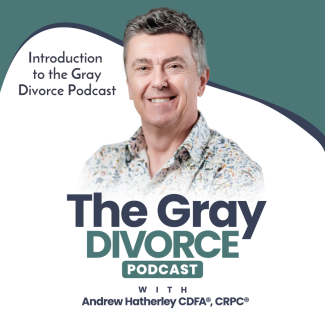
The Gray Divorce Podcast: Episode 1 Introduction to the Gray Divorce Podcast
Hi everyone! This is the first episode of the Gray Divorce podcast.
Let's start with the why. Why am I doing this podcast?
Well, as you might have guessed I'm familiar with gray divorce personally. I went through my first, and hopefully last divorce, at the age of 51. It was finalized a day after my 52nd birthday. I learned a lot from the experience: personally, financially, emotionally, psychologically. I am determined to help others who have experienced divorce after 50 not only learn from my mistakes but benefit from some of the tools, practices, mindsets, and experiences that have helped me enjoy an increasingly satisfying, purposeful life after divorce.
I also think it's very important to deal with the financial and life issues surrounding divorce after 50. The financial implications of getting divorced in our 50s and 60s, even later, can have a big impact on our retirement plans. We may be forced to reexamine what we think of when we think of retirement. I know I did. Fortunately for the better. It forced me to reappraise my attitudes towards work and leisure and develop a much more balanced life.
I also address a point that you will hear many times repeatedly in future podcast episodes. That is, there is life after divorce. When we get divorced, we emerge from a situation that's not right for us. Let's look at it as an opportunity to reset and rebuild. An opportunity to create. It's not easy. But it doesn't have to be as difficult as our imaginations might sometimes make it.
We can rebuild and renew and make the next act of our life one of purpose, growth, meaning and creativity.
So, the goal of this podcast is to educate, entertain, and hopefully inspire. My personal credo is that inspiration is the best gift a person can give to another person. The Gray Divorce Podcast will discuss topics and interview experts with the goal of giving you the tools or inspiration to help you live your best life going forward.
I look forward to sharing the divorce after 50 journey with you!
Transcript
Announcement: [00:00:00] Welcome to the Gray Divorce Podcast, hosted by divorce financial analyst and retirement planning counselor Andrew Hatherley. Join Andrew and guest experts as they help late life divorcees build the financial and mental foundation for a meaningful future. There is life after divorce. Now on to the show.
Andrew Hatherley: Hello, my name is Andrew Hatherly and welcome to the first episode of the Gray Divorce Podcast. Today there are no guests or specific topics. I'd just like to introduce myself and the subject of Gray Divorce and discuss why I think it's a noble endeavor to share this phenomenon with the world. In the form of this podcast, we should probably define terms to start.
Gray Divorce, as you might suspect, is generally defined as divorce after the age of 50. Nothing too complicated about that. As [00:01:00] noted in the podcast introduction, I am a divorce financial analyst and chartered retirement planning counselor, and I often work with people dealing with mid to late life divorce.
The simple fact is gray divorce is on the rise big time, while the overall divorce rate in the US has been essentially flat over the last 30 years among US adults aged 15 and older. The divorce rate has roughly doubled since the 1990s, and among people age 65 and older, the divorce rate has roughly tripled since 1990.
What this means is that there are increasing number of Americans who are having to rebuild their lives financially, emotionally, socially. Later in. These are people and maybe you count yourselves among them who may have planned to quit their job or moved to another part of the country or even another part of the world, [00:02:00] and maybe you or people you know had plans to start a new business or creative endeavor.
If you are divorced, you've likely seen your net worth cut in half, and you may wonder how you're going to manage your investments and generate income in retire. Maybe your view of retirement has completely changed, and you must face the prospect of working longer than you had hoped. Perhaps your social bonds with friends and family have been damaged and you're feeling increasingly lonely.
There may also be issues of declining health combined with the financial and emotional stress of divorce. These are all issues we'll be tackling in upcoming episodes of the podcast Now. I'm familiar with many of these issues personally. I went through my first and hopefully last divorce at the age of 51.
It was, uh, finalized a day after my [00:03:00] 52nd birthday. Happy birthday to me, and I learned so many things. Financially, emotionally, psychologically, from my experience that I determined to help others not only learn from the mistakes that I made, but benefit from some of the tools, practices, mindsets, and experiences that have helped me and many other gray divorces enjoy an increasingly satisfying, purposeful life.
So the goal of this podcast is to. Hopefully entertain, and most importantly, inspire. I happen to think that to inspire is the best gift a person can give someone, and with that goal in mind, the Gray Divorce Podcast will investigate topics and interview experts to give you the tools or inspiration to help you on your quest for a better, healthier, more purposeful.[00:04:00]
Let's address for a minute what's behind this growing trend in gray divorce. I think there are five key reasons. The first is the increased acceptance of divorce in our society. Older adults will continue to be more accepting of divorce in the future as either they or people around them experience divorce.
Second. A gr, a growing share of older adults are in a second marriage reflecting divorce experienced earlier in their lives, and the fact is remarriages are likelier to end in divorce than first marriages. In fact, while about 45% of first marriages fail, that number rises to the mid 60% level for second marriages and even higher for third marriage.
Why second and third marriage failure rate should be so high as a subject worthy of a separate [00:05:00] podcast episode altogether? We'll save that for another day. Third reason for the increase, uh, this trend in growing trend in gray divorce. Well, the increased participation of women in the labor. Is conducive to divorce in that women increasingly have the economic freedom to support themselves outside of marriage.
Four, increased life expectancy that decreases the likelihood that marriages will end through death and increases the exposure to the risk of divorce. And a fifth factor leading to the increase in late life. Divorce is a rise in the industry of personal development. Books, articles, educational programs all encourage people to live up to their potential, to follow their dreams, and to reject those people like a spouse who may be stunting their personal.
The fact is, if you're in a marriage where your goals and [00:06:00] dreams show little sign of developing or potentially flourishing, you might be encouraged to get out while you've still got time. I noted earlier that the key issue of gray divorce is that people are rebuilding their financial and personal lives late in the game.
This is significant because patterns and habits built over many years are suddenly interrupt. and we've had expectations. For instance, with respect to retirement. You know, we've been building a financial nest egg, and suddenly that's been cut in half. That nest egg has been accumulating over the course of our working lives.
If we're getting divorced later in life and our household net worth is effectively being split in two, we've got less time to recover financially. This may mean working longer and suffering a reduced standard of. at a time when we were also dealing with the emotional issues resulting from the failure of the marriage.
[00:07:00] Not only has the marriage a relationship bond that we thought would last our lifetime been broken, but other others around us children, other family members and friends, well they've been negatively affected as well. We may wonder if we'll ever find another partner or fear that we're destined to live out the rest of our lives in a state of lone.
These are serious issues and it can all sound pretty depressing, but I want to end this brief conversation today. On a positive note. One thing I've learned is that when we're going through divorce, we often think the worst is going to happen. Our imaginations run wild with the negative stories that build up in our heads or the tales we hear from.
I remember I was told by my ex that I'd have to work for the rest of my life to pay off alimony. Believe it or not, I believe that for a few days. But when your world is being turned upside [00:08:00] down, your brain doesn't always function at its highest capacity. In fact, some of us refer to this as divorce brain.
It's lousy. Timing when you're facing was probably the most important financial decision of your. And your emotions are so frazzled. Consider that the worst outcome that you imagine while going through divorce rarely happens. Your brain prepares you for the worst because your brain's essentially triggering that prehistoric DNA.
You're running away from a sabertooth tiger. Even the worst divorce case, despite all the drama, doesn't stand up to getting mauled in the jungle. There is life after. Let's face it, in divorce, you are emerging from a situation that wasn't right for you. Look at it as an opportunity to reset and rebuild.
An opportunity to create, to create a new you. It's a step in [00:09:00] the right direction, and it's a challenge. It's not easy, but it doesn't have to be as difficult as some of the demons in your head might tell you, and the rewards can be tremendous. You can rebuild and renew and make sure the second or third act of your life is full of growth and creativity and lived with meaning, purpose, and contentment.
I look forward to sharing the journey with you and hope you'll tune into future episodes of the podcast. Stay tuned. Until next time,
Announcement: thanks so much for tuning into this episode of The Gray Divorce Podcast. To learn more or get in contact with your host, you can visit Andrew's website at TranscendRetirement.net.
Also, please feel free to rate, subscribe and labor review wherever. Listen to your podcast. That helps others find the show and we greatly appreciate it. Thanks again for listening and we'll catch you in the next episode.[00:10:00]
Andrew Hatherley: Information provided is educational only and should not be construed as legal or tax advice. Each situation is unique and should be discussed with your tax or legal advisor prior to implementation. Andrew Hatherley is not an attorney and does not provide legal advice. Information provided is financial in nature.
Advisory services offered through Hatherley Capital Management, LLC. Divorce Financial Analysis Services offered through Wiser Divorce Solutions and affiliated company.

